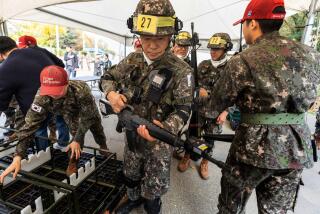S. Korean Vets Push U.S. for Compensation
- Share via
WASHINGTON — South Korean veterans who fought alongside U.S. troops in the Vietnam War are pressing Washington for $1 billion in compensation that they claim is owed them under a secret deal sealed 33 years ago between their government and the Lyndon B. Johnson administration.
The veterans, who say they represent as many as 30,000 former soldiers and survivors, contend that the 1966 deal entitles Korean veterans or their families to payments for death or injuries, including those attributed to the herbicide Agent Orange.
The United States paid about 6,000 Korean veterans and survivors a total of $10.1 million in death and disability compensation after the war, U.S. officials say.
But that was before thousands of troops developed symptoms of illnesses that may have been caused by Agent Orange, which was used to clear forest vegetation. The chemical has been held responsible for a variety of illnesses, including cancers and birth defects, but its effects often take many years to appear.
Moreover, the Koreans did not share in a $182-million Agent Orange claims fund that a consortium of chemical companies paid in the early 1990s to Vietnam vets from the United States, Australia, New Zealand and Canada.
That exclusion is “shocking,” Park Se Jeik, a South Korean congressman and retired general, said at a Washington news conference Tuesday.
South Korea contributed 320,000 troops to the war--the largest number after the United States--said Park, who is also vice president of South Korea’s United Liberal Democrats party.
But “the best friend and ally of the United States,” he said, “has been forgotten.”
Although the South Korean government is not a party to a lawsuit the veterans filed in U.S. District Court in Philadelphia, Seoul has asked the State Department to consider the claim. So far, the State Department has not officially responded, sources say. The South Korean National Assembly, meanwhile, has voted unanimously to support the campaign for more compensation, Park said.
The lawyers representing the Vietnam veterans say that Winthrop G. Brown, then the U.S. ambassador to South Korea, made the compensation commitment in March 1966--at a time when President Johnson was eager to find international support for his escalating war in Southeast Asia.
The Johnson administration had agreed to put up $150 million in economic development loans to pay salaries and buy weapons for the Korean. According to the Brown memorandum, which was declassified in 1997, the Americans sought to sweeten the deal by offering to double what they had previously committed as compensation for injuries and death.
The memo did not, however, specify what those figures would be.
According to the memo, the Koreans agreed to the deal and soon supplied a brigade of more than 4,000 troops. The Koreans escalated their military involvement and fought until 1973.
So far, the South Korean government has confirmed 17,800 cases that it says are related to Agent Orange.
The U.S. government, in arguing for dismissal of the lawsuit, contends that the statute of limitations on Vietnam War claims has long since run out.
Government lawyers argue in court papers that the Brown memorandum was not a binding commitment to pay specified amounts to veterans but a treaty between two governments. They say the issue is a political one that should be decided by the two governments.
More to Read
Sign up for Essential California
The most important California stories and recommendations in your inbox every morning.
You may occasionally receive promotional content from the Los Angeles Times.











